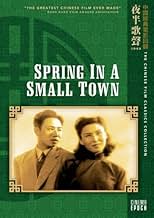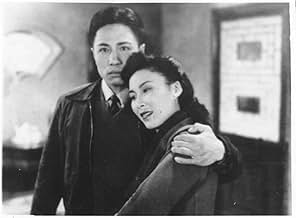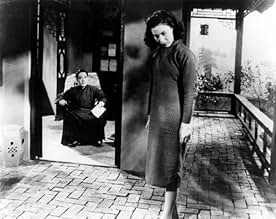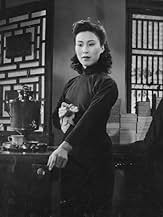IMDb RATING
7.3/10
3.6K
YOUR RATING
A lonely housewife finds her monotonous life altered when her childhood sweetheart returns to town.A lonely housewife finds her monotonous life altered when her childhood sweetheart returns to town.A lonely housewife finds her monotonous life altered when her childhood sweetheart returns to town.
- Awards
- 1 win total
- Director
- Writer
- All cast & crew
- Production, box office & more at IMDbPro
Featured reviews
If you are looking for a slice of life movie, look no further. A word of caution, however: this movie is a story, and a child of its time. There is no spectacular camera work, no epic soundtrack (or sound at all, for the most part), and certainly no special effects. Even the acting and dialogues are passable, at best. If you need any of these things to be immersed or even enjoy a movie, Spring in a Small Town is not for you.
There are four characters in the movie (and I mean four, there are no other supporting cast members or extras). The first two we are introduced are a couple, and they are "content". This is he best word to describe their situation, for they are not happy nor sad. You quickly realize that they have been frozen in time for years.
The conflict is created when an old friend (of both) comes back to town. This establishes the classic love triangle: the old friend has feelings for the wife, and she is torn between her own feelings towards him (or what she believes them to be) and those towards her husband.
There is little more to say about this movie without spoiling, except reiterate that this is a Chinese movie from the 40's. This is very much removed from the "factory assembled" plot lines that have plagued movies/books/video games/series for a long time.
If you were keeping track, the fourth character is the couple's caretaker, and he is a supporting character.
In the end, i still walk away with a lesson: no matter how much we think our life will stay the same, things will always happen. Whether they create change or not, is up to us.
There are four characters in the movie (and I mean four, there are no other supporting cast members or extras). The first two we are introduced are a couple, and they are "content". This is he best word to describe their situation, for they are not happy nor sad. You quickly realize that they have been frozen in time for years.
The conflict is created when an old friend (of both) comes back to town. This establishes the classic love triangle: the old friend has feelings for the wife, and she is torn between her own feelings towards him (or what she believes them to be) and those towards her husband.
There is little more to say about this movie without spoiling, except reiterate that this is a Chinese movie from the 40's. This is very much removed from the "factory assembled" plot lines that have plagued movies/books/video games/series for a long time.
If you were keeping track, the fourth character is the couple's caretaker, and he is a supporting character.
In the end, i still walk away with a lesson: no matter how much we think our life will stay the same, things will always happen. Whether they create change or not, is up to us.
For Romance's sake, as a married man. The following two films are recommended.
1. Brief Encounter by David Lean (1945), UK
Well, when a woman goes to a railway station, something may happen. And it happened! How she longed to be there, in a little tavern waiting for the man of her dreams. But she was married... the man was a stranger to the fantasizing woman
2. Xiao Cheng Zhi Chun by Fei Mu (1948), China
Well, when a woman goes to the market to buy fish, grocery and medicine, passing through the ruins of an ancient wall in a small town, there is much to think about, about the melancholy of her life, her sick husband in self-pity and lack of future...Just when a jubilant young doctor arrived, something happened... the doctor was a high school honey of the fantasizing woman
In both movies, from great directors of UK and China, the passion vs restraint was so intense, yet in the end the intimate feelings had not developed into any physical contacts. That leaves you with a great after-taste, sniffing it intensely without biting it.
1. Brief Encounter by David Lean (1945), UK
Well, when a woman goes to a railway station, something may happen. And it happened! How she longed to be there, in a little tavern waiting for the man of her dreams. But she was married... the man was a stranger to the fantasizing woman
2. Xiao Cheng Zhi Chun by Fei Mu (1948), China
Well, when a woman goes to the market to buy fish, grocery and medicine, passing through the ruins of an ancient wall in a small town, there is much to think about, about the melancholy of her life, her sick husband in self-pity and lack of future...Just when a jubilant young doctor arrived, something happened... the doctor was a high school honey of the fantasizing woman
In both movies, from great directors of UK and China, the passion vs restraint was so intense, yet in the end the intimate feelings had not developed into any physical contacts. That leaves you with a great after-taste, sniffing it intensely without biting it.
Xiao Chen Zhi Chun is a great movie, not only in the year it was shot but also now. It's an art movie which is not outdated even in 21st century. The director maintained a good narrative skill and thus made the story so smooth!
The movie reminds me of the later French new wave movie: Francois Truffaut's "Femme d'a cote" which is of the similar topic.
The movie reminds me of the later French new wave movie: Francois Truffaut's "Femme d'a cote" which is of the similar topic.
Produced in 1948 prior to the Communist takeover in China, Spring in a Small Town is a lyrical depiction of the intense psychological rivalry between two friends for the love of one woman. Directed by Fei Mu and based on a short story by Li Tianji, the film dramatizes the emotional entanglement of four people, conveying an intense eroticism that is powerful and haunting. Dai Liyan (Shi Yu), and his wife Zhou Yuwen, magnificently portrayed by the alluring Wei Wei, live in his old family house with Liyan's teenage sister, Dai Xiu (Zhang Hongmei) and the family servant Lao Huang (Cui Chaoming). Because of Liyan's tuberculosis, they are forced to sleep in separate rooms. Yuwen is a loyal and devoted wife but is bored and prefers to spend her time embroidering or going for solitary walks along the top of the crumbling city wall.
When Zhang Zhichen (Li Wei), a boyhood friend of Liyan who is now a doctor arrives from Shanghai, it is revealed that Yuwen was his childhood sweetheart when she was only sixteen. The tension becomes palpable as each character is forced to hide their true self and feelings are expressed only with glances, body language, mannerisms, and silence. Zhichen's arrival brings a spark of life to the moribund household and soon all are taking walks together, singing songs, and playing games. The relationship between Yuwen and Zhichen slowly becomes rekindled and is crystallized at Xiu's 16th birthday party when both have too much to drink. When Yuwen cuts her hand on broken glass after a struggle with Zhichen, however, a distressing event occurs that transforms everyone's life.
Spring in a Small Town has an elegance and intimacy that I found lacking in the remake last year by Tian Zhuanghuang. By depicting events from Yuwen's point of view and adding a poetic voiceover, Mu's film brings us much closer to the characters. Spring in a Small Town did not receive immediate critical acclaim when it was released and Fei Mu was labeled a "rightist" and left for Hong Kong, never to make another film. The film only began to find its audience when the China Film Archive made a new print in the early 80s. Now many Chinese critics consider it the greatest Chinese film ever made. I certainly would not argue with that.
When Zhang Zhichen (Li Wei), a boyhood friend of Liyan who is now a doctor arrives from Shanghai, it is revealed that Yuwen was his childhood sweetheart when she was only sixteen. The tension becomes palpable as each character is forced to hide their true self and feelings are expressed only with glances, body language, mannerisms, and silence. Zhichen's arrival brings a spark of life to the moribund household and soon all are taking walks together, singing songs, and playing games. The relationship between Yuwen and Zhichen slowly becomes rekindled and is crystallized at Xiu's 16th birthday party when both have too much to drink. When Yuwen cuts her hand on broken glass after a struggle with Zhichen, however, a distressing event occurs that transforms everyone's life.
Spring in a Small Town has an elegance and intimacy that I found lacking in the remake last year by Tian Zhuanghuang. By depicting events from Yuwen's point of view and adding a poetic voiceover, Mu's film brings us much closer to the characters. Spring in a Small Town did not receive immediate critical acclaim when it was released and Fei Mu was labeled a "rightist" and left for Hong Kong, never to make another film. The film only began to find its audience when the China Film Archive made a new print in the early 80s. Now many Chinese critics consider it the greatest Chinese film ever made. I certainly would not argue with that.
No other country suffered longer from the effects of war in the Twentieth Century than China, especially against Japan in its 1931 invasion of Manchuria all the way to the end of World War Two, losing millions of people. After WW2, China's film industry picked up the pieces, revitalizing its earlier 1930s 'Golden Era.' In the short time between the Japanese surrender in 1945 and the Communist takeover in 1949, China produced some of the country's most noteworthy movies, none greater, according to film historians and critics than April 1948's "Spring in a Small Town."
In a way, "Spring in a Small Town" draws parallels between China's post-WW2 and the county's cinematic hopes of regaining its position of producing the world's most prolific movie output. The Wenhua Film Company, based in Shanghai, which was known as the 'Hollywood of China,' was stablished to produce low budget dramas and intelligent comedies. Fei Mu, 41, a director since 1933, was hired by Wenhua Film, and assigned a script written by Li Tianji. The screenplay was pared down by Mu, who limited the picture to only four main characters, three of whom were members of a once wealthy family that saw their life savings and large mansion destroyed in the war. Husband Liyan (Shi Yu) is depressed about his situation, affecting his marriage with Yuwen (Wei Wei). Liyan's much younger sister Xiu (Zhang Hongmei), hasn't been as affected by the war as her brother, and is relatively cheerful, symbolizing the new, more optimistic next generation. Liyan's childhood friend Zhang Zhichen (Lu Wei) pays them a visit. His chipper personality sparks pleasant memories of Yuwen when the two used to date years ago. Meanwhile, teenager Xiu begins to get tingly over Zhichen, while Yuwen feels the same way, forcing Liyan to do something drastic.
In his essay on "Spring in a Small Town," Roderick Heath likened the Chinese movie to David Lean's 1945's "Brief Encounter." He wrote, "Both movies describe potential adulterous affairs, intensely personal, almost eventless tales all the better to unravel the tight wrapping on survivors of wartime, revealing the frustration wrought by subordinating personal desires to communal needs and faced with new choices completely at odds with the settled values all that fighting was supposed to defend and the habits of stoicism." The small window of Shanghai's independent film industry closed when the Chinese Nationals fled the country after facing the onslaught of Mao Zedong's Red Army in 1949. Director Fei Mu escaped to Hong Kong with other filmmakers before he died in 1951 at 45 from a heart attack while working at his desk. The victorious Communists felt Mu's movies were too right wing to show, and suppressed his work until the 1980s after the Cultural Revolution ended. With the reopening of the China Film Archives, the Chinese began to appreciate Mu's films, in particular "Spring in a Small Town." The Archives reconstructed a new print from the original negative, drawing scores of modern audiences worldwide to admire Mu's classic.
Many polls and lists include "Spring in a Small Town" as the Best Chinese Movie Ever Made, including the Hong Kong Film Critics, which in a 2010 poll voted the Mu movie the country's number one film. The Hong Kong Film Awards, equivalent to Hollywood's Academy Awards, selected it in 2005 as the top choice of the 100 Best Chinese Motion Pictures selected. It is included as one of '1001 Movies You Must See Before You Die.' A 2002 remake was produced, titled 'Springtime in a Small Town,' directed by Tian Zhuangzhuang, while a 2015 play created by the Chinese National Theatre under 1948's title retained the same names and the exact dialogue from the original picture.
In his essay on "Spring in a Small Town," Roderick Heath likened the Chinese movie to David Lean's 1945's "Brief Encounter." He wrote, "Both movies describe potential adulterous affairs, intensely personal, almost eventless tales all the better to unravel the tight wrapping on survivors of wartime, revealing the frustration wrought by subordinating personal desires to communal needs and faced with new choices completely at odds with the settled values all that fighting was supposed to defend and the habits of stoicism." The small window of Shanghai's independent film industry closed when the Chinese Nationals fled the country after facing the onslaught of Mao Zedong's Red Army in 1949. Director Fei Mu escaped to Hong Kong with other filmmakers before he died in 1951 at 45 from a heart attack while working at his desk. The victorious Communists felt Mu's movies were too right wing to show, and suppressed his work until the 1980s after the Cultural Revolution ended. With the reopening of the China Film Archives, the Chinese began to appreciate Mu's films, in particular "Spring in a Small Town." The Archives reconstructed a new print from the original negative, drawing scores of modern audiences worldwide to admire Mu's classic.
Many polls and lists include "Spring in a Small Town" as the Best Chinese Movie Ever Made, including the Hong Kong Film Critics, which in a 2010 poll voted the Mu movie the country's number one film. The Hong Kong Film Awards, equivalent to Hollywood's Academy Awards, selected it in 2005 as the top choice of the 100 Best Chinese Motion Pictures selected. It is included as one of '1001 Movies You Must See Before You Die.' A 2002 remake was produced, titled 'Springtime in a Small Town,' directed by Tian Zhuangzhuang, while a 2015 play created by the Chinese National Theatre under 1948's title retained the same names and the exact dialogue from the original picture.
Did you know
- TriviaVoted the best Chinese-language film of all time by the Hong Kong Film Academy in 2004.
- Alternate versionsThere is an Italian edition of this film on DVD, distributed by DNA Srl: " PRIMAVERA IN UNA PICCOLA CITTÀ (Spring in a Small Town, 1948) + LA DEA (The Goddess, 1934)" (2 Films on a single DVD). The film has been re-edited with the contribution of film historian Riccardo Cusin. This version is also available for streaming on some platforms.
- ConnectionsFeatured in Venice 70: Future Reloaded: Zhangke Jia (2013)
- How long is Spring in a Small Town?Powered by Alexa
Details
- Release date
- Country of origin
- Language
- Also known as
- Proleće u malom gradu
- Production company
- See more company credits at IMDbPro
- Runtime
- 1h 38m(98 min)
- Color
- Sound mix
- Aspect ratio
- 1.37 : 1
Contribute to this page
Suggest an edit or add missing content

























